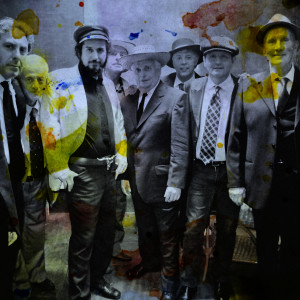{:en}City of Loano national award for traditional Italian music 9th edition
Friday, July 26, 2013 - 9:30 p.m. - Prince's Garden Summer Arena
VINICIO CAPOSSELA presents
THE MAIL GANG
“Wedding Music”
Band of the Post: Giuseppe Caputo “Matalena” (violin), Franco Maffucci “Parrucca” (guitar and vocals), Giuseppe Galgano “Tottacreta” (accordion), Giovanni Briuolo (guitar, mandolin), Vincenzo Briuolo (mandolin, accordion), Giovanni Buldo “Bubù” (bass), Antonio Daniele (drums), Crescenzo Martiniello “Papp'lon” (organ), Gaetano Tavarone “Nino” (guitars).
GUESTS: Vinicio Capossela, Asso Stefana, Taketo Gohara
Production: La Cupa - Coordination: Luciano Linzi
Musica per Sposalizio is taken from the album “Primo Ballo,” recorded by Banda della Posta in October 2012, produced by Vinicio Capossela and Asso Stefana, and recorded by Taketo Gohara.
“Marriage has been the body and bread of the community. The founding brick of the community. It was consumed with food and music. It was a kind of eucharist in which the new couple was ingested by the community, which huddled around them, wrapping them in streamers in the last, endless dance of the “ziti” (that's what the bride and groom are called as much as the pasta). The music swirled up in tempo until it absorbed the couple, who ended up spinning around wrapped like a skewer in a colorful pinwheel of paper threads. At that point it was digested and ready to generate and renew community.
This music that accompanied the ritual was humble, dance music, suitable for lightening the macaroni barrels and “sponzare” the white shirts, which ended up wet and soggy, like the Christians who wore them. A repertoire of mazurkas, polkas, waltzes, double steps, tango, tarantella, quadrille and foxtrot, which was basically common in Italy in the 1950s and 1960s, and which became codified as a kind of genre classic at a time when ’wedding’ was the main occasion for music, meeting and dancing. Then electronic keyboards took over and weddings became weddings. Air conditioning entered another kind of refreshments in which music became a kind of dessert more related to ballroom dancing than to the mythical era of bellows, violins and farfisa.
In Calitri, in upper Irpinia , in the years when a community existed, which later ended up shattered in the migrations that were the living blood of development, this community was renewed and celebrated in a pivotal place in the village: the “house of the Eca.” In the stories of my childhood, it became the “house of the Echo.” The house where the echo was born. Echo of music, of cackling, of pranks, of parties, the place of the pantheon of mythical characters that make a community in which one is renamed and really re-acknowledged, in the nickname that the community itself imposes, in place of the church.
For a few decades the Echo House has been silent, and the only echo that spreads is that of stories. If photographs of all the couples were hung in it, it would be a war shrine. Young men in their wedding uniforms who went out to face, shooting, life after clearing tables at the Echo house.
A few years ago, a group of elderly players from that golden age not without misery made a habit of gathering in front of the Post Office on a sunny afternoon. They looked like old gunslingers in straws. Asked what they were doing lurking in front of that post office, they replied that they were mounting guard at the Post Office, to check on the arrival of the pension. When the check arrived, relieved they would pull their instruments out of their cases and have a play. Their repertoire makes feet and dust rise and shirts soak on pants. It reminds us of simple and enduring things. They perform it impassively and solemnly, from the height of the thousand marriages in which they have shelled out the hits. They have glory-in-the-dust names: Tottacreta, Matalena, the Chinese, Wig. The most impassive of them did not even need a nickname, so lapidary was the original name: Rocco Briuolo. Now Rocco went to play “two Paradises” among the saints he painted as his companions. Between Saint Canio and Saint Liborio. Now he can, as in the old song, tell Saint Peter looking down, that “our Paradise is this one.” And with reason, for his humanity, his violin and his brush, brought a little of the divine into us who knew him. His “Band of the Post” accompanies him with the philosophy in which he lived: work well done, never taking itself seriously. Dedicated to him is this concert that also accompanies us in an evening of stories, music, cic’ to cic’ and bottaculo. In quadrilles, in cinquillas, all the way to the Incontrè.”
Vinicio Capossela
For press information: lucia campana cell 347.8334469
{:}

